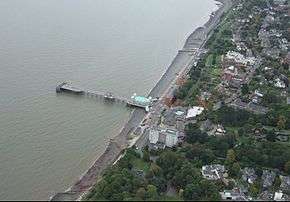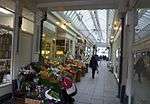Listed buildings in Penarth

There are many listed buildings in Penarth, a seaside town in the Vale of Glamorgan, Wales. Penarth was popular with holidaymakers from far afield, but also a popular place to live for the wealthy business owners of Penarth and nearby Cardiff. The town has a wealth of Victorian and Edwardian architecture.
A listed building is one considered to be of special architectural, historical or cultural significance, and has restrictions on amendments or demolition. Buildings are listed as either Grade I, II* and II buildings lists, with the Grade I being the most important.[1]
Key
| Grade | Criteria[2] |
|---|---|
| Grade I | Buildings of exceptional, usually national, interest (generally the top 2%). |
| Grade II* | Particularly important buildings of more than special interest. |
| Grade II | Buildings of special interest, which warrant every effort being made to preserve them. |
Grade I and II* listed buildings
| Name | Photograph | Grade | Date | Location | Description |
|---|---|---|---|---|---|
| St Augustine's Church, Church Place |
 |
I | 1866 | Penarth Head 51°26′28″N 3°10′04″W / 51.4410°N 3.1679°W |
Designed by architect William Butterfield and built between 1865 and 1866, replacing a ruined medieval church which was no longer large enough for the growing parish.[3] |
| St Peter's Church, off Sully Road | .jpg) |
II* | 1100s | Old Cogan 51°25′39″N 3°11′45″W / 51.4275°N 3.1958°W |
12th-century church extended in the early 1500s and restored in 1888-1894 by architect William Frame.[4] |
Grade II listed buildings
According to the British Listed Buildings website there are 44 buildings in Penarth listed as Grade II, in addition to a bridge, a cenotaph, a pillar box and five telephone boxes. These include:
| Name | Photograph | Grade | Date | Location | Description |
|---|---|---|---|---|---|
| Albert Road Infants School, Albert Road |  |
II | 1876 | Penarth Head 51°26′28″N 3°10′16″W / 51.4410°N 3.1712°W |
Later enlarged in the early 1900s by local architect J. Coates Carter.[5] |
| Baron's Court or Cogan Pill House |  |
II | 1500 | Cogan 51°26′52″N 3°11′18″W / 51.4479°N 3.1884°W |
Late 15th or early 16th-century hall house, originally known as Cogan Pill, with later 19th-century additions. Owned by the Herbert family of St Fagans Castle for many generations.[6] It is the only medieval hall building in South Wales to still be open from floor to roof.[7] Now a pub and restaurant. |
| Cenotaph, Alexandra Park |  |
II | 1924 | Penarth 51°26′09″N 3°10′09″W / 51.4359°N 3.1691°W |
Designed by Sir W. Goscombe John and completed in 1924, the Cenotaph is located at the high point of Alexandra Park. It is made from white granite and has a bronze statue of Winged Victory on the east face. Commemorates those who died in the two world wars.[8] |
| Coastguard Cottage, Marine Parade |  |
II | 1840 | Penarth 51°25′57″N 3°10′11″W / 51.4324°N 3.1697°W |
Built c. 1840 by The Admiralty as accommodation for the local coastguard. It is well preserved with an original Georgian staircase and large cellars.[9] The house is located high above the seafront with a view over the sea. It adjoins a row of terraced houses (1–5 Tower Hill Avenue) which were also built as coastguard accommodation and are similarly Grade II listed.[10] |
| Custom House, Docks Road |  |
II | 1865 | Penarth Marina 51°26′41″N 3°10′02″W / 51.4446°N 3.1671°W |
Located west of Marine Buildings at the entrance to the old Penarth Dock, a Renaissance style building completed c. 1865 probably designed by the dock designer Samuel Dobson.[11] |
| Footbridge at Cogan railway station |  |
II | 1888 | Cogan 51°26′46″N 3°11′15″W / 51.4461°N 3.1876°W |
Late 19th century cast iron footbridge over a section of the railway to Barry which opened in December 1888. The bridge has Corinthian columns, ball finials to the ballustrade and pierced quatrefoils in the stair risers.[12] |
| Headlands School, Paget Place | .jpg) |
II | 1868 | Penarth Head 51°26′33″N 3°09′57″W / 51.4424°N 3.1659°W |
Originally the Penarth Hotel, built by Taff Vale Railway Company. Purchased after the First World War, becoming a nautical training school known as the J A Gibbs Home; later renamed The Headlands School. Four storey building in grey stone.[13] |
| Marine Buildings, Docks Road | .jpg) |
II | 1865 | Penarth Marina 51°26′41″N 3°09′59″W / 51.4446°N 3.1665°W |
Next door to the Customs House at the entrance to Penarth Docks, built in a French Renaissance style c. 1865 probably designed by the dock designer Samuel Dobson.[14] The building was used as a hotel and later offices until the early 1980s. There were plans in the 2010s to convert the derelict building into a hotel.[15] |
| Penarth Pier and Pavilion, The Esplanade |  |
II | 1895 / 1929 | Penarth (sea front) 51°26′05″N 3°09′54″W / 51.4346°N 3.1650°W |
Originally completed in 1895 but substantially altered since. The current Pavilion building was completed in 1929.[16] Restoration efforts took place in 1994-98 and again in the 2010s.[17] The Pavilion was re-roofed and refurbished to include a cinema, exhibition space and cafe, reopening in December 2013.[18] |
| Penarth Public Library, Stanwell Road |  |
II | 1906 | Penarth (centre) 51°26′13″N 3°10′20″W / 51.4370°N 3.1721°W |
Designed by the architect of the Windsor estate, H. Snell, and paid for by a Carnegie Foundation grant.[19] |
| St Joseph's Church, Grove Terrace |  |
II | 1915 | Penarth (centre) 51°26′19″N 3°10′48″W / 51.4387°N 3.1800°W |
The main body of the church was completed by 1915, though the church was not fully built until after World War I. Designed by London architect, F. A. Walters, in an Italian Romanesque style.[20] |
| Trinity Methodist Church, Stanwell Road |  |
II | 1901 | Penarth 51°26′10″N 3°10′37″W / 51.4362°N 3.1770°W |
In a Perpendicular style, by Cardiff architect Harry Budgen.[21] |
| Turner House Gallery, Plymouth Road |  |
II | 1888 | Penarth (centre) 51°26′07″N 3°10′21″W / 51.4353°N 3.1725°W |
Designed by Cardiff architect Edwin Seward to display a collection of J. M. W. Turner paintings.[22] |
| Windsor Arcade Building, Windsor Terrace |  |
II | 1898 | Penarth (centre) 51°26′19″N 3°10′21″W / 51.4386°N 3.1726°W |
Adjoining the Grade II listed Lloyds Bank in the town centre, the neo-Classical building was designed by Edward Webb and dates to 1898. The shopping arcade is described as "Penarth's most significant C19 commercial building".[23] |
| Yacht Club House, Esplanade | |
II | 1884-95 | Penarth (sea front) 51°25′57″N 3°10′03″W / 51.4324°N 3.1676°W |
North section built c. 1884 and south section added in 1895. Built as a clubhouse for Penarth Boat Club.[24] |
See also
- Listed buildings in the Vale of Glamorgan
- Grade I listed buildings in the Vale of Glamorgan
- Grade II* listed buildings in the Vale of Glamorgan
References
- ↑ "Buildings & Conservation Areas: Listing". Cadw. 2011. Retrieved 30 March 2013.
- ↑ Listed Buildings in Wales: What is Listing? (PDF) (third ed.), Cadw, 2005, p. 6, retrieved 19 March 2013
- ↑ "St Augustine's Parish Church, Church Place, Penarth". British Listed Buildings. Retrieved 24 February 2016.
- ↑ "St Peter's Church, Penarth". British Listed Buildings. Retrieved 24 February 2016.
- ↑ "Albert Road County Infants School, Albert Road, Penarth". British Listed Buildings. Retrieved 6 March 2016.
- ↑ "Barons Court PH, Penarth". British Listed Buildings. Retrieved 26 February 2016.
- ↑ John Newman (1995), The Buildings of Wales: Glamorgan, University of Wales Press, p. 50, ISBN 0-14-071056-6
- ↑ "Cenotaph, Alexander Park, Penarth". British Listed Buildings. Retrieved 27 February 2016.
- ↑ "Coastguard Cottage (No.2 Marine Parade) Tower Hill Avenue, Penarth". British Listed Buildings. Retrieved 27 February 2016.
- ↑ "No.1 Tower Hill Avenue, Penarth". British Listed Buildings. Retrieved 27 February 2016.
- ↑ "Customs House, Docks Road, Penarth". British Listed Buildings. Retrieved 24 February 2016.
- ↑ "Footbridge at Cogan Station, Cogan Hill, Penarth". British Listed Buildings. Retrieved 26 February 2016.
- ↑ "Headlands School, Paget Place, Penarth". British Listed Buildings. Retrieved 6 March 2016.
- ↑ "Marine Buildings, Docks Road, Penarth". British Listed Buildings. Retrieved 24 February 2016.
- ↑ "Four-star future for derelict Bay building". Wales Online. 14 December 2011. Retrieved 24 February 2016.
- ↑ "Penarth Pier (Including Pavilion & Shops) the Esplanade, Penarth". British Listed Buildings. Retrieved 24 February 2016.
- ↑ "Penarth Pier, The Esplanade, Penarth". RCAHMW. Retrieved 24 February 2016.
- ↑ "Revamped Penarth pier pavilion opens doors again". BBC News. 22 September 2011. Retrieved 24 February 2016.
- ↑ "Penarth Pier (Including Pavilion & Shops) the Esplanade, Penarth". British Listed Buildings. Retrieved 24 February 2016.
- ↑ "St. Joseph's Church, Penarth". British Listed Buildings. Retrieved 24 February 2016.
- ↑ "Trinity Methodist Church, Stanwell Road, Penarth". British Listed Buildings. Retrieved 6 March 2016.
- ↑ "Turner House Art Galley, Plymouth Road, Penarth". British Listed Buildings. Retrieved 24 February 2016.
- ↑ "Windsor Arcade Building, Penarth". British Listed Buildings. Retrieved 26 February 2016.
- ↑ "Penarth Yacht Club House, The Esplanade, Penarth". British Listed Buildings. Retrieved 24 February 2016.
Sources
- Penarth, Vale of Glamorgan, BritishListedBuildings.co.uk
- Royal Commission on the Ancient and Historical Monuments of Wales (RCAHMW) website listings